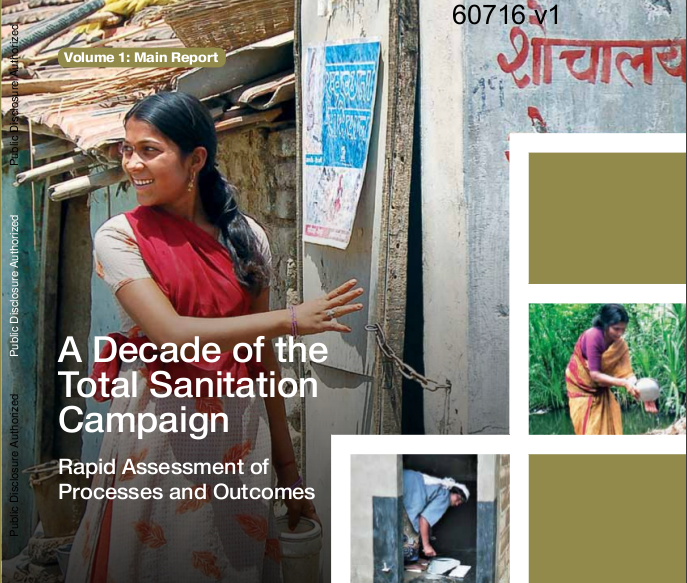/topics/health
Health
Communal toilets in urban poverty pockets - A WaterAid report
Posted on 22 Nov, 2014 10:30 AMThis report published by WaterAid describes the findings of the study conducted in seven poverty pockets in Bhopal to look at patterns of use of communal latrine facilities. Much has been invested in building communal and public toilets and more resources are likely to continue to support this form of sanitation in dense urban areas in India.
However, there is no evidence available that is needed to quantify their potential contribution to reducing open defecation and faecal pollution in these environments, and identify those design features and management factors that encourage the highest usage rates by all household members. Also there is no information available on the impact of age and gender related differences in patterns of use.
Sanitation : The hygienic means of promoting health : Indian Journal of Public Health
Posted on 22 Nov, 2014 10:30 AMThis article published in the Indian Journal of Public Health highlights the importance of sanitation as hygienic means of dealing with health of populations and presents the history and the definition of sanitation and highlights t
Uttar Pradesh Urban Sanitation Policy Jawaharlal Nehru National Urban Renewal Mission Government of India 2010
Posted on 22 Nov, 2014 10:30 AMThe factors that lead to this poor sanitation situation in the city include:
Department of Drinking Water and Sanitation Information on water and sanitation in India
Posted on 22 Nov, 2014 10:30 AMA huge number of links are present on these sites which provide access to various data and information regarding the status of rural drinking water & sanitation and related government projects.
A decade of the Total Sanitation Campaign - Rapid assessment of processes and outcomes: A report by the Water and Sanitation Program 2011
Posted on 22 Nov, 2014 10:30 AM The Water and Sanitation Program has analysed secondary data on the Total Sanitation Campaign (TSC) available on government websites and conducted primary analysis in 22 sample districts spread across 21 states.
The Water and Sanitation Program has analysed secondary data on the Total Sanitation Campaign (TSC) available on government websites and conducted primary analysis in 22 sample districts spread across 21 states.
With the use of secondary and primary data the report has not only been able to give a macro view of the TSC but also has been able to go into the nitty-gritty of the campaign. There are case studies of districts and villages that have achieved open defecation free status.
Development of training module for water safety plan in urban areas A document by ESCI
Posted on 22 Nov, 2014 10:30 AMA Water Safety Plan (WSP) is an improved risk management tool designed to ensure the delivery of safe drinking water. It identifies hazards, means to control them, means and actions to identify loss of control and its restoration. It comprises system assessment and design, operational monitoring and management plans (including documentation and communication). Water quality guidelines have been issued by the WHO.
Assessing acute Gastroenteritis risks associated with water quality and sanitation in Hyderabad city A paper by the Institute of Health Systems IHS
Posted on 22 Nov, 2014 10:30 AMThe quality of drinking water is a vital element of public health and well-being. The most effective means of consistently ensuring the safety of a drinking-water supply is through the use of a comprehensive risk assessment and risk management approach that encompasses all steps in water supply from catchment to consumer.
WHO guidelines on water quality term these approaches as water safety plans (WSPs), developed to organize, systematize and apply management practices in drinking-water quality.
Eradication of manual scavenging : Recent PIB Releases
Posted on 22 Nov, 2014 10:30 AM The Union Minister of Social Justice & Empowerment Shri Mukul Wasnik recently inaugurated the two-day Consultation Meeting on Eradication of Manual Scavenging and Rehabilitation of Manual Scavengers.Speaking on the occasion, he called upon the States to work towards eradicating the shameful practice of manual scavenging by the end of the 11th plan. He regretted that despite various efforts made by the Central Government and the States, the practice of manual scavenging still exist in some parts of the country. The meeting was organized by the Ministries of Social Justice & Empowerment, Urban Poverty Alleviation and Urban Development.
Shri Wasnik said that we must address rehabilitation of manual scavengers to our utmost capacity.
Compilation of 300 hands on field activities for community based adaptation
Posted on 22 Nov, 2014 10:30 AM
 This collection of CBA field activities began as a resource for online CBA students. However, as it grew, we decided that it was important to make it more broadly available to CBA development practitioners worldwide. The activities are organized in the following framework.
This collection of CBA field activities began as a resource for online CBA students. However, as it grew, we decided that it was important to make it more broadly available to CBA development practitioners worldwide. The activities are organized in the following framework.
24th national convention of IPHE India on Water and sanitation utility services in India and their health implications held in Bhubaneshwar
Posted on 22 Nov, 2014 10:30 AMThe 24th National Convention of Institution of Public Health Engineers (India) on the theme “Water & Sanitation Utility Services in India and their health implications” will be organised by IPHE(I), Regional Centre, Bhubaneswar during 12th -13th February,2011.





